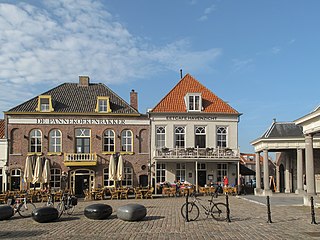Related Research Articles
Master of the Mint is a title within the Royal Mint given to the most senior person responsible for its operation. It was an important office in the governments of Scotland and England, and later Great Britain, between the 16th and 19th centuries. Until 1699, appointment was usually for life. Its holder occasionally sat in the cabinet.
The Comptroller of the Household is an ancient position in the British royal household, nominally the second-ranking member of the Lord Steward's department after the Treasurer of the Household. The Comptroller was an ex officio member of the Board of Green Cloth, until that body was abolished in the reform of the local government licensing in 2004. In recent times, a senior government whip has invariably occupied the office. On state occasions the Comptroller carries a white staff of office, as often seen in portraits.
Edward Harwood (1729–1794) was a prolific English classical scholar and biblical critic.
The 37th Regiment of Foot was a line infantry regiment of the British Army, raised in Ireland in February 1702. Under the Childers Reforms it amalgamated with the 67th Regiment of Foot to become the Hampshire Regiment in 1881.
General The Hon. James St Clair, was a Scottish soldier and Whig politician.

Admiral George Edgcumbe, 1st Earl of Mount Edgcumbe, PC was a British peer, naval officer and politician.
This is a list of the sheriffs and high sheriffs of Staffordshire.
James Mundell was a Scottish educator. He founded and ran the exclusive Mr Mundell's school in the West Bow of Edinburgh, from 1735 to 1762.

Caleb Whitefoord was a Scottish merchant, diplomat, and political satirist.

Lieutenant General Roger Handasyd, also spelt Handaside, 11 March 1689 to 4 January 1763, was an English military officer and Member of Parliament for different seats between 1722 and 1754.

Sir Busick Harwood was an English physician who became Professor of Anatomy at Cambridge.
Events from the year 1814 in Scotland.
The Sheriff of Haddington, or Sheriff of East Lothian, was historically the royal official responsible for enforcing law and order in Haddington, Scotland. Prior to 1748 most sheriffdoms were held on a hereditary basis. From that date, following the Jacobite uprising of 1745, the hereditary sheriffs were replaced by salaried sheriff-deputes, qualified advocates who were members of the Scottish Bar.
James Coutts was a Scottish politician, merchant and founder of the Coutts & Co. bank.
References
- ↑ "Fellows of the Royal Society". London: Royal Society. Archived from the original on 2015-03-16.
- ↑ "Fellowship of the Royal Society 1660-2015". London: Royal Society. Archived from the original on 2015-10-15.
- ↑ "Gilbert Blane". Royal Society. Retrieved 15 June 2016.
- ↑ "Charles Theodore". Royal Society. Retrieved 15 June 2016.
- ↑ "Thomas Gresley". Royal Society. Retrieved 15 June 2016.
- ↑ "Busick Harwood". Royal Society. Retrieved 15 June 2016.
- ↑ "Henry Hugh Hoare". Royal Society. Retrieved 15 June 2016.
- ↑ "George Kinnaird". Royal Society. Retrieved 15 June 2016.
- ↑ "Thomas Potter". Royal Society. Retrieved 15 June 2016.
- ↑ "Marquis Sannazzaro". Royal Society. Retrieved 15 June 2016.
- ↑ "John Sheldon". Royal Society. Retrieved 15 June 2016.
- ↑ "John Sinclair". Royal Society. Retrieved 15 June 2016.
- ↑ "Caleb Whitefoord". Royal Society. Retrieved 15 June 2016.
- ↑ "George Yonge". Royal Society. Retrieved 15 June 2016.